China Arts & Entertainment
From Comedy to Controversy: Behind the Li Haoshi Incident
Exploring the dynamics that led to the social storm involving Chinese comedian ‘House’ Li Haoshi.
Published
2 years agoon
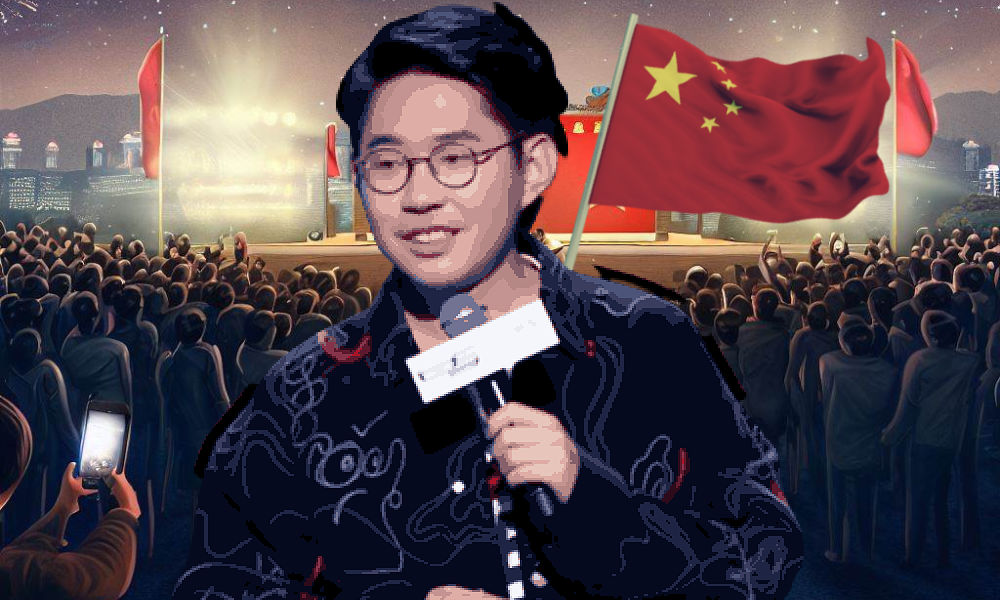
PREMIUM CONTENT
The Li Haoshi scandal sheds light on a complex interplay of factors, including the working conditions within the Chinese comedy industry, the expectations placed on performers in China’s entertainment realm, and the significant role of the People’s Liberation Army (PLA) in shaping Chinese nationalism. A deep dive by What’s on Weibo.
Humor is no joking matter. While the business of humor can be competitive and challenging no matter where you are in the world, there are some special considerations and implications for working in humor in China.
This week, Chinese comedian Li Haoshi (李昊石), who performs under the name ‘House’, experienced firsthand that there are strict limitations to what can be openly satirized or joked about in China today. When one of his jokes about two stray dogs described them by referencing a famous People’s Liberation Army (PLA) slogan, he found himself at the center of a social media storm. One related hashtag received over 1.1 billion views on social media platform Weibo this week.
The phrases used in the comic skit, with Li saying they came to mind while watching the dogs chasing a squirrel, were: “Forge exemplary conduct, fight to win.” The lines are part of the PLA slogan “Follow the Party! Fight to win! Forge exemplary conduct!” (“听党指挥,能打胜仗,作风优良!”), which was used by Xi Jinping in 2013.
Li Haoshi was not just socially canceled by angry netizens who defended the honor of Chinese soldiers and slammed the comedian for being so unpatriotic, he also saw his career go up in flames. His shows were called off, he was banned from social media, his employer was fined more than $2 million, he was blacklisted under orders of the China Performing Arts Association (CAPA), and he is now under official investigation.
Following the controversy, there were different views on Chinese social media regarding the issue (read more here). Although the majority of commenters argued that the PLA is never to be joked about, some people also lamented that online discussions lacked nuance.
This scandal sheds light on a complex interplay of factors, including the working conditions within the Chinese comedy industry, the expectations placed on performers in the Chinese entertainment world, and the important role played by the People’s Liberation Army (PLA) in shaping Chinese nationalism.
HUMOR AND STAND-UP COMEDY IN CHINA
Humor has played a prominent role in Chinese language and culture for centuries, manifested through a diverse array of jokes and humorous texts. Professional comedians, who served to entertain the aristocrats, have been around since as early as 800 BC.
Although humor has always been there, it has not necessarily always been appreciated. Confucianism has played a significant role in devaluing humor in China, as it formally regarded humor and satire as inferior forms of aesthetic expression. Chinese rulers who did not tolerate criticism or dissent also could not appreciate jokes or comics which, in any way, went against their rule and authority (Sullivan & Sullivan 2021, 102; Yue 2008, 403-413).
In the early days of modern China, following the collapse of the Qing dynasty, there was a notable resurgence of various forms of humor and jokes that spanned two decades, including cross-talk (xiàngsheng 相声) and skits (xiǎopǐn 小品). It was during this period that the Mandarin word “yōumò” (幽默) was introduced, derived from the English term “humor.” This term was coined by the renowned Chinese writer and translator Lin Yutang (林语堂), who faced the challenge of finding an exact Chinese translation for the English word (Hsu 2015, 2).
For decades, from the founding of People’s Republic of China to the Anti-Rightists Movement and the Cultural Revolution and beyond, there was not much yōumò around. As described by David Moser (2004), the constraints imposed by the Party and political sensitivities severely limited the content and topics that comedians could explore.
The comparatively relaxed political atmosphere of the post-Mao era gave rise to novel forms of humor and comedy. In subsequent years, influenced by the United States, “stand-up comedy” (tuōkǒuxiù 脱口秀) also gained popularity. Initially originating in small bars or cafes in major cities such as Shanghai and Beijing, this comedic genre swiftly spread across the nation.
But similar to numerous other performance forms in China, stand-up comedy faces challenges in maintaining its spontaneity and provocative nature. Performers and comedy clubs are required to obtain licenses and gain script approval, while also navigating strict boundaries regarding politically sensitive topics that are strictly off-limits (Sullivan & Sullivan 2021: 102).
This does not mean that stand-up comedy is not thriving in China. On the contrary, the genre has only become more popular over recent years as stand-up comedy performers skillfully navigate the boundaries of what is acceptable by employing different techniques, such as irony, self-deprecation, and surreal humor to offer alternative perspectives within the permitted discourse (see: Chen and Gao 2023). In doing so, Chinese stand-up comedy has evolved beyond its American influences and embraced more traditional Chinese comedic language techniques from xiàngsheng and other performing arts.
In today’s landscape, Chinese comedians face a multitude of boundaries beyond just political ones. Operating within an environment where cultural and commercial factors hold significant sway, it becomes almost inevitable for popular performers to encounter controversy at some point in their careers. Authorities, audiences, sponsors, or companies may take offense at the content of their comedic expressions, adding further complexity to their navigation of these boundaries.
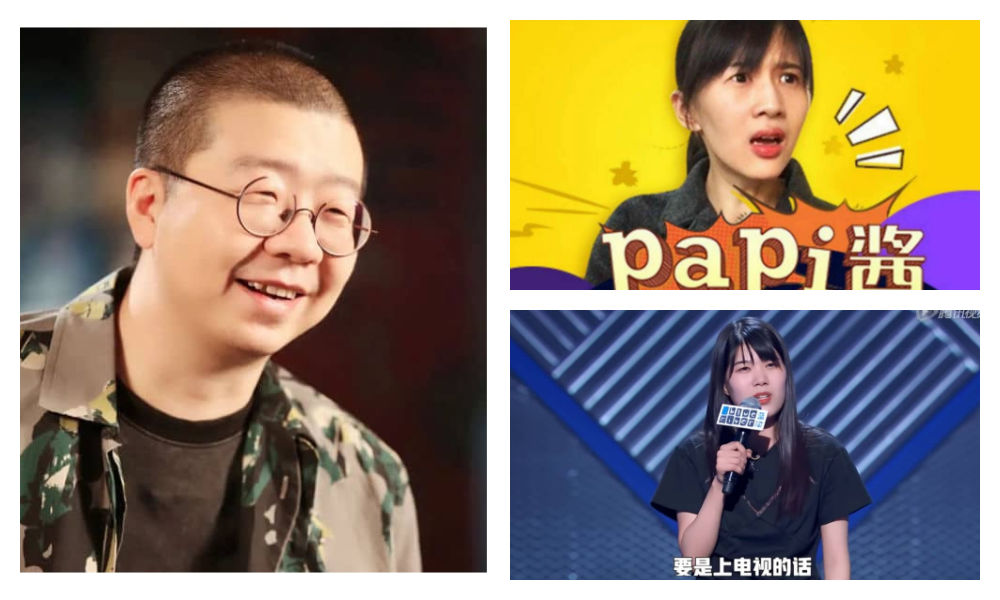
Li Dan, Papi Jiang, and Yang Li previously also faced criticism for their “inappropriate” or “vulgar” jokes.
The online comedian Papi Jiang (Papi酱), for example, saw her videos being taken offline in 2016 for containing “vulgar language and content,” after which she vowed to choose her words more carefully in the future. Female stand-up comedian Yang Li (杨笠), also known as the “punchline queen,” was dismissed as the spokesperson for American tech company Intel in 2021 for her jokes that allegedly insulted men. The popular talk show host and comedian Li Dan (李诞) sparked controversy for promoting female underwear brand Ubras with a slogan that was deemed sexist.
In such a working environment, it is difficult to fathom that the 31-year-old Li Haoshi, who had previously appeared on the immensely popular stand-up comedy competition show “Rock & Roast” Season Four, was unaware that his reference to a PLA slogan would surpass the acceptable boundaries. However, like many comedians, he may simply have been testing the limits.
THE POWER OF PERFORMERS
Another factor that comes into play when exploring the reasons behind the ‘House’ scandal is the special role attributed to Chinese performers.
Although Chinese performers and renowned names in the cultural industries have always been seen as fulfilling an exemplary role, this notion holds even greater significance in the era of social media, where Chinese performers and celebrities wield tremendous influence in an online environment with over one billion internet users. The rapid growth of online entertainment-focused apps and platforms has also created opportunities for unknown performers to achieve overnight fame.
There have been various studies about celebrities in China. One study from 2019 by Sullivan and Kehoe highlights the complexity of China’s celebrity scene. Because while the industry flourishes, it still operates under strict regulations imposed by both the state and industry stakeholders. Additionally, moral values play a significant role in shaping the industry. Sullivan and Kehoe argue that the state, through media and cultural industries, retains control over the symbolic economy within which celebrities operate (2019, 242).
Channeling public opinion and safeguarding social stability are priorities for Chinese authorities, and the influence of Chinese celebrities is often used to promote Party ideology and policies. While authorities encourage Chinese famous performers to act as positive role models, negative news surrounding the country’s popular stars is often perceived as having a “negative social impact” or a “bad influence on public morale.”
There are some some noteworthy instances that exemplify the significance of moral values and the role of Chinese celebrities as role models. One such example occurred in 2019 when Roy Wang (Wang Yuan 王源), a young Chinese singer and actor widely regarded as one of the country’s most influential teenagers, found himself embroiled in controversy after being caught smoking during a restaurant dinner in Beijing.

The incident surrounding Wang’s smoking quickly ignited a firestorm on Chinese social media. The controversy stemmed from two main factors. Firstly, Beijing had implemented a ban on smoking in all public indoor spaces since 2015, making Wang’s actions a violation of the law by lighting up in a restaurant. Additionally, as an influential teen icon, Wang held the responsibility of being a role model to his numerous fans, amplifying the impact of his behavior.
The idea that China should “raise the bar” for becoming a celebrity was widely propagated in 2021. In that same year, the China Association of Performing Arts (CAPA) officially released new guidelines for Chinese performers aimed at promoting adherence to the principles of “social morality.” According to these guidelines, performers could face a permanent ban from their profession if they fail to comply.
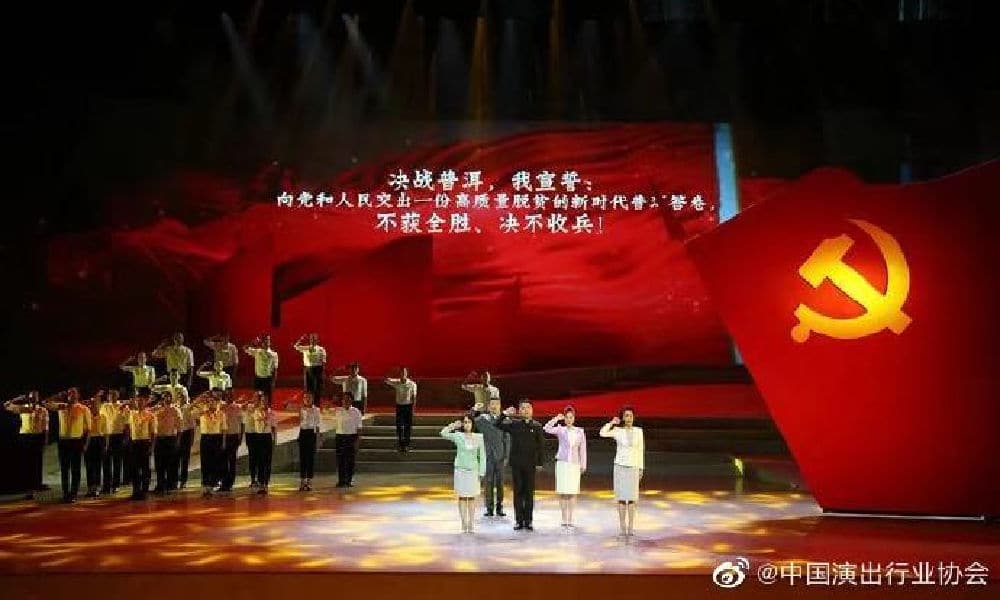
The guidelines are meant to “promote the healthy development of the performer industry” and lay out the “practice norms,” which stipulate that performers, among other things, should abide by national laws and regulations, should honor their contracts and comply with copyright laws. But they also stipulate that they should “love the motherland and support the Party’s line and policies” (“热爱祖国,拥护党的路线方针政策”), “persevere in the orientation that literature and art should serve the people and socialism” (“坚持文艺为人民服务、为社会主义服务的方向”), and “actively uphold a positive image” (“积极树立正面形象”).
By joking about the PLA, Li Haoshi violated some of the rules laid out by CAPA. His severe punishment not only demonstrates to the public that Chinese performers/celebrities should abide by the same laws as ordinary citizens – if not be held to even higher moral standards, – it also serves as a cautionary message to other entertainers, urging them not to overstep boundaries and to uphold their responsibility as public figures to positively impact public morale.
THE SACRED PLA
In addition to Li Haoshi’s position as a stand-up comedian and his role as a performer/celebrity, another significant aspect of this controversy revolves around the status of the People’s Liberation Army (PLA) in contemporary China. PLA soldiers are revered as the heroic “soldier sons of the people” who display unwavering loyalty to the Party and the nation.
The People’s Liberation Army (PLA) was founded in 1927, with Mao Zedong counted among its founders. It played a crucial role in the rise of the Chinese Communist Party and the establishment of the People’s Republic of China in 1949.
In addition to its core duty of protecting the country and conducting military operations, the PLA is also involved in other tasks such as peacekeeping efforts and disaster relief. However, its primary and most significant role is to serve as the military branch of the Chinese Communist Party (CCP) and ensure the CCP’s continued leadership in China. By safeguarding China’s sovereignty, territorial integrity, and unity, the PLA carries both a military and symbolic significance.
The PLA plays a major part in Chinese nationalist discourses, while simultaneously also playing a central role in driving nationalism in China. Whether it is the social media spectacle of China’s Taiwan military exercises or ‘100.000 soldier loving girls‘ during the Wuhan floods, the PLA acts as “a bridge between nationalism as an abstract ideological concept and as an everyday concern of the people for the security of their country” (Ji 2004, 248).
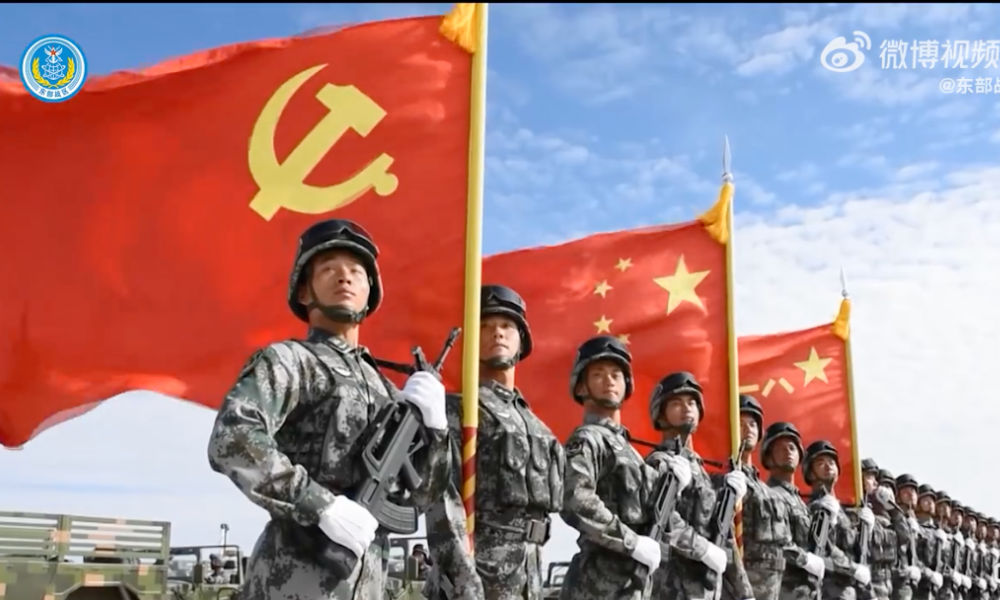
Military propaganda, often disseminated online, is important in reinforcing the image of PLA soldiers as guardians of the nation. When four Chinese PLA soldiers were killed during a border clash with Indian troops in 2020, Chinese state media outlets made noteworthy efforts to shape the ways in which the soldiers are to be remembered, blending political and personal elements while lauding their unwavering patriotism. In doing so, they posted their photos along with phrases such as “The place where I stand is China” and “I will defend the motherland with my life.”
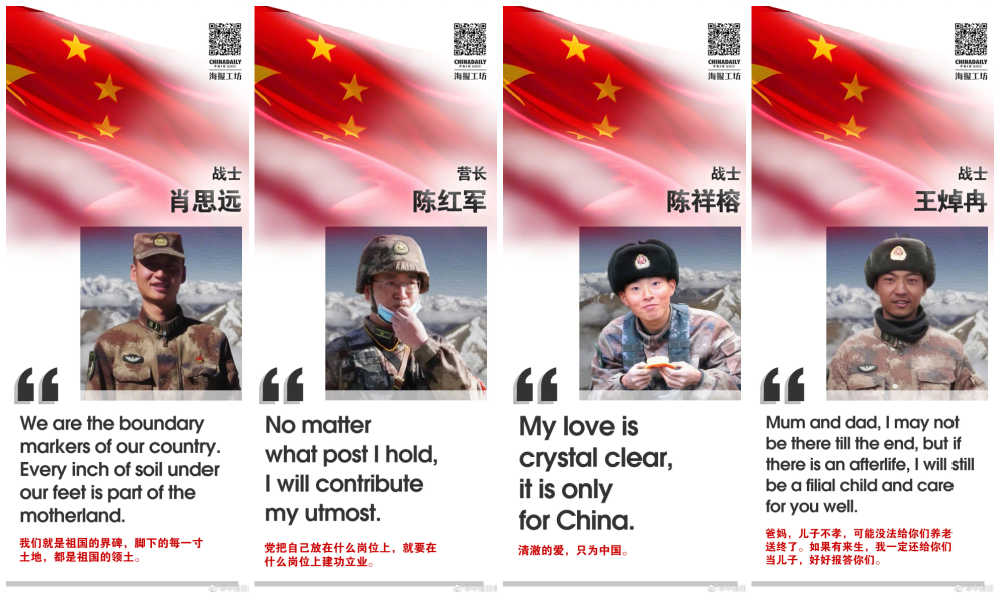
Those insulting the PLA can face serious consequences under the “Heroes and Martyrs Protection Law” which was introduced in 2018. In 2021, former Economic Observer journalist Qiu Ziming (仇子明), along with two other bloggers, were the first persons to be charged under the new law as they were detained for “insulting” the Chinese soldiers. Qiu, who had 2.4 million fans on his Weibo page, made remarks questioning the number of casualties China said it suffered in the India border clash. He was sentenced to eight months in prison.
Li Haoshi’s faux-pas is particularly sensitive because the lines used in his joke indirectly made a comparison between PLA soldiers and stray dogs, while also placing words famously used by Xi Jinping in a ridiculous context. Additionally, as highlighted by Chinese bloggers and China Digital Times editor Alexander Boyd, Li’s joke potentially alludes to a scene from the 1956 Chinese war movie Battle on Shangganling Mountain (上甘岭) during the Korean War, where soldiers were depicted chasing after a squirrel. The intention of the scene was allegedly to showcase the kind-hearted nature of the brave soldiers of the Volunteer Army.
Was Chinese comedian Li Haoshi, with his controversial dog-chasing-squirrel joke, alluding to this squirrel-chasing scene from the famous 1956 Chinese Korean War movie "Battle on Shangganling Mountain"? Various Weibo bloggers claim that there is a connection. pic.twitter.com/2AjQKeIhVD
— Manya Koetse (@manyapan) May 21, 2023
Some people believe that Li Haoshi was purposely alluding to that scene with his joke, and in doing so, insulted China’s Korean War ‘martyrs,’ which is illegal under the martyr defamation law. That would be a serious offense. In 2022, former investigative journalist Luo Changping was sentenced to seven months in prison and ordered to make a public apology for insulting Chinese soldiers portrayed in a blockbuster movie about the Korean War.
Whether or not Li intended to make such a connection or put much thought into his joke remains uncertain. However, many netizens are angry with Li for various reasons. Chinese nationalists defend the honor of their hero soldiers, while others blame Li for not respecting the boundaries within which he should operate.
Furthermore, Li’s colleagues, Chinese stand-up comedians, are also upset that he took the risk of making a politically incorrect joke, which has put the entire industry under scrutiny. This incident has created more tension for other performers in an already challenging work environment.
On Chinese social Q&A platform Zhihu, one experienced stand-up comedian performer from Shandong shared his view on the matter, suggesting that Li has brought harm to their industry:
“For commercial performances, our lines have to first have to go through a script reading meeting, they will then go through 4-6 open rounds of ‘polishing,’ and then go through the script polishing of the copywriters working for the show. (..) Moreover, the words and phrases we use in our jokes must have a contextual understanding and source. Therefore, there is no way that Li Haoshi was not aware of the history and origin of the sentences he used.
At the same time, all of our jokes in commercial performances require approval. Therefore, Li Haoshi obviously knew that this particular joke wouldn’t pass the approval, so he intentionally didn’t submit it. This is not a case of ignorance, it is simply being malicious.”
Overall, Li Haoshi’s case serves as a warning to others to be cautious with their words, whether used during performances, talk shows, interviews, or online.
Jokes are not to be taken lightly in a media environment where every line carries weight. When humor becomes such a serious matter, it becomes increasingly challenging to stay funny.
By Manya Koetse
References (other online sources hyperlinked in text)
Chen, Dan, and Gengsong Gao. 2023. “The Transgressive Rhetoric of Standup Comedy in China.” Critical Discourse Studies 20 (1): 1-17.
Hsu, Pi-ching. 2015. Feng Menglong’s Treasury of Laughs. Leiden, The Netherlands: Brill.
Ji, You. 2004. “Nationalism, the Chinese Defence Culture and the People’s Liberation Army.” In: Leong H. Liew and and Shaoguang Wang (eds), Nationalism, Democracy and National Integration in China, pp. 247-268. London: RoutledgeCurzon.
Moser, David. 2004. “Stifled Laughter: How the Communist Party Killed Chinese the Chinese Humor Form of Xiangsheng.” Danwei.org http://www.danwei.org/tv/stifled_laughter_how_the_commu.php, accessed via https://www.academia.edu/5929719/Stifled_Laughter_How_the_Communist_Party_Killed_Chinese_the_Chinese_Humor_Form_of_Xiangsheng [20 May 2023].
Sullivan, Lawrence R. and Nancy Sullivan. 2021. Historical Dictionary of Chinese Culture. New York and London: Rowman & Littlefield
Sullivan, Jonathan, and Séagh Kehoe. 2019. “Truth, Good and Beauty: The Politics of Celebrity in China.” The China Quarterly 237 (March): 241–256.
Yue, Xiao Dong. 2008. “Exploration of Chinese Humor.” Humor: International Journal of Humor Research 21 (4): 407-421.
Get the story behind the hashtag. Subscribe to What’s on Weibo here to receive our newsletter and get access to our latest articles:
Spotted a mistake or want to add something? Please let us know in comments below or email us. First-time commenters, please be patient – we will have to manually approve your comment before it appears.
©2023 Whatsonweibo. All rights reserved. Do not reproduce our content without permission – you can contact us at info@whatsonweibo.com.
Manya is the founder and editor-in-chief of What's on Weibo, offering independent analysis of social trends, online media, and digital culture in China for over a decade. Subscribe to gain access to content, including the Weibo Watch newsletter, which provides deeper insights into the China trends that matter. More about Manya at manyakoetse.com or follow on X.

China ACG Culture
A Very Short Guide to China’s Most Popular Designer Toys
Published
1 month agoon
July 6, 2025
In our last article, we’ve determined how Wakuku’s rise is not just about copying & following in Labubu’s footsteps and more about how China is setting the pace for global pop culture IPs. I now want to give you a small peek into the main characters in the field that are currently relevant.
Even if these dolls aren’t really your thing, you’ll inevitably run into them and everything happening around them.
Before diving into the top trending characters, a quick word on the challenges ahead for Labubu & co:
🚩 Bloomberg Opinion columnist Shuli Ren recently argued that Labubu’s biggest threat isn’t competition from Wakuku or knockoffs like “Lafufu,” but the fragility of its resale ecosystem — particularly how POP MART balances supply, scarcity, and reseller control.
Scarcity is part of what makes Labubu feel premium. But if too many dolls go to scalpers, it alienates real fans. If scalpers can’t profit, Labubu risks losing its luxury edge. Managing this dynamic may be POP MART’s greatest long-term challenge.
🚩 Chinese Gen Z consumers value authenticity — and that’s something money can’t manufacture. If China’s booming IP toy industry prioritizes speed and profit over soul, the hype may die out at a certain point.
🚩 The same goes for storytelling. Characters need a solid universe to grow in. Labubu had years to build out its fantasy universe. Cute alone isn’t enough — characterless toys don’t leave a lasting impression and don’t resonate with consumers.

Examples of popularity rankings of Chinese IP toys on Xiaohongshu.
With that in mind… let’s meet the main players.
On platforms like Xiaohongshu, Douyin, and Weibo, users regularly rank the hottest collectible IPs. Based on those rankings, here’s a quick who’s-who of China’s current trend toy universe:

1. Labubu (拉布布)
Brand: POP MART
Creator: Kasing Lung
Year launched: 2015 (independent), 2019 with POP MART.
The undisputed icon of China’s trend toy world, Labubu is a mischievous Nordic forest troll with big eyes, nine pointy teeth, and bunny ears. Its quirky, ugly-cute design, endless possibilities of DIY costume changes, and viral celebrity endorsements have made it a must-have collectible and a global pop culture phenomenon.

2. Wakuku (哇库库)
Brand & Creator: Letsvan, backed by QuantaSing Group
Year launched: 2024 with first blind box
Wakuku, a “tribal jungle hunter” with a cheeky grin and unibrow, is seen as the rising star in China’s trend toy market. Wakuku’s rapid rise is fueled by celebrity marketing, pop-up launches, and its strong appeal among Gen Z, especially considering Wakuku is more affordable than Labubu.

3. Molly (茉莉)
Brand: POP MART
Designer: Kenny Wong (王信明)
Year launched: 2006 (creator concept); POP MART 2014, first blind boxes in 2016
Molly is a classic trend toy IP, one of POP MART’s favorites, with a massive fanbase and long-lasting popularity. The character was allegedly inspired by a chance encounter with a determined young kid at a charity fundraiser event, after which Kenny Wong created Molly as a blue-eyed girl with short hair, a bit of a temperament, and an iconic pouting expression that never leaves her face.

4. SKULLPANDA (骷髅熊猫)
Brand: POP MART
Creator: Chinese designer Xiong Miao
Year launched: 2018 (creator concept); POP MART 2020
Skullpanda is one of POP MART’s flagship IPs —it’s a goth-inspired fantasy design. According to POP MART, SKULLPANDA journeys through different worlds, taking on various personas and living out myriad lives. On this grand adventure, it’s on a quest to find its truest self and break new ground all while contemplating the shape of infinity.
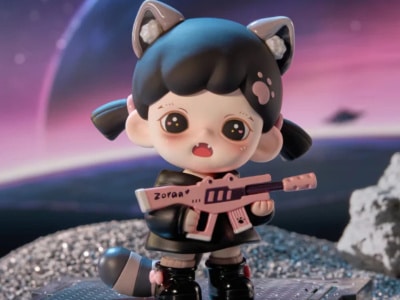
5. Baby Zoraa
Brand: TNT SPACE
Creator: Wang Zequn, CEO of TNT SPACE
Year launched: 2022, same year as company launch
Baby Zoraa is cute yet devlish fierce and is one of the most popular IPs under TNT SPACE. Baby Zoraa is the sister of Boy Rayan, another popular character under the same brand. Baby Zoraa’s first blind box edition reached #1 on Tmall’s trend toy sales charts and sold over 500,000 units.

6. Dora (大表姐)
Brand: TNT SPACE
Year Launched: 2023
Dora is a cool, rebellious “big sister” figure, instantly recognizable for her bold attitude and expressive style. She’s a Gen Z favorite for her gender-fluid, empowering persona, and became a breakout sucess under TNT when it launched its bigger blind boxes in 2023.

7. Twinkle Twinkle [Star Man] (星星人)
Brand: POP MART
Creator: Illustrators Daxin and Ali
Year launched: In 2024 with POP MART
This character has recently skyrocketed in popularity as a “healing star character” inspired by how stars shine even in darkness. POP MART markets this character as being full of innocence and fantasy to provide some relaxation in this modern society full of busyness and pressure.

8. Hirono (小野)
Brand: POP MART
Creator: Lang
Year launched: In 2024 with POP MART
This freckled, perpetually grumpy boy has a wild spirit combining introversion and playful defiance. Hirono highlights the subtle fluctuations of life, its ups and downs, incorporating joy, sadness, fear, and more – a personification of profound human emotions.

9. Crybaby (哭娃)
Brand: POP MART
Creator: Thai artist Molly Yllom (aka Nisa “Mod” Srikamdee)
Year launched: 2017 (creator concept), 2023 POP MART launch
Like Wakuku, Crybaby suddenly went from a niche IP to a new hot trend toy in 2025. Together with Wakuku, it is called the “next Labubu.” Thai artist Molly Yllom created the character after the loss of her beloved dog. Crybaby is a symbol of emotional expression, particularly the idea that it’s okay to cry and express feelings.

10. Pouka Pouka (波卡波卡)
Brand: 52TOYS
Creator: Ma Xiaoben
Year launched: 2025
With its round, chubby face, squirrel cheeks, playful smile, and soft, comforting appearance, Pouka Pouka aims to evoke feelings of warmth, healing, and emotional comfort.
Other characters to watch: CiciLu, Panda Roll (胖哒幼), NANCI (囡茜), FARMER BOB (农夫鲍勃), Rayan, Ozai (哦崽), Lulu the Piggy (LuLu猪), Pucky (毕奇).
By Manya Koetse
(follow on X, LinkedIn, or Instagram)
Spotted a mistake or want to add something? Please let us know in comments below or email us. First-time commenters, please be patient – we will have to manually approve your comment before it appears.
©2025 Whatsonweibo. All rights reserved. Do not reproduce our content without permission – you can contact us at info@whatsonweibo.com.
China ACG Culture
The Next Labubu: What the Rise of Wakuku Tells Us About China’s Collectible Toy Wave
From ugly-cute rebellion to a new kind of ‘C-pop,’ the breakout success of Wakuku sheds light on Chinese consumer culture and the forces driving China’s trend toy industry.
Published
1 month agoon
July 6, 2025
Wakuku is the most talked-about newcomer in China’s trend toy market. Besides its mischievous grin, what’s perhaps most noteworthy is how closely Wakuku follows the marketing success of Labubu. As the strongest new designer toy of 2025, Wakuku says a lot about China’s current creative economy — from youth-led consumer trends to hybrid business models.
As it is becoming increasingly clear that Chinese designer toy Labubu has basically conquered the world, it’s already time for the next made-in-China collectible toy to start trending on Chinese social media.
Now, the name that’s trending is Wakuku, a Chinese trend toy created by the Shenzhen-based company Letsvan.
In March 2025, a new panda-inspired Wakuku debuted at Miniso Land in Beijing, immediately breaking records and boosting overall store revenue by over 90%. Wakuku also broke daily sales records on May 17 with the launch of its “Fox-and-Bunny” collab at Miniso flagship stores in Shanghai and Nanjing. At the opening of the Miniso Space in Nanjing on June 18, another Wakuku figure sold out within just two hours. Over the past week, Wakuku went trending on Chinese social media multiple times.

From left to right: the March, May, and June successful Wakuku series/figurines
Like Labubu, Wakuku is a collectible keychain doll with a soft vinyl face and a plush body. These designer toys are especially popular among Chinese Gen Z female consumers, who use them as fashion accessories (hanging them from bags) or as desk companions.
We previously wrote in depth about the birth of Labubu, its launch by the Chinese POP MART (founded 2010), and the recipe for its global popularity in this article, so if you’re new to this trend of Chinese designer toys, you’ll want to check it out first (link).
Labubu has been making international headlines for months now, with the hype reaching a new peak when a human-sized Labubu sold for a record 1.08 million RMB (US$150,700), followed by a special edition that was purchased for nearly 760,000 RMB (US$106,000).
Now, Wakuku is the new kid on the block, and while it took Labubu nine years to win over young Chinese consumers, it barely took Wakuku a year — the character was created in 2022–2023, made its retail debut in 2024, and went viral within months.
Its pricing is affordable (59–159 RMB, around $8.2-$22) and some netizens argue it’s more quality for money.
While Labubu is a Nordic forest elf, Wakuku is a tribal jungle warrior. It comes in various designs and colors depending on the series and is sold in blind boxes (盲盒), meaning buyers don’t know exactly which design they’re getting — which adds an element of surprise.
➡️ There’s a lot to say about Wakuku, but perhaps the most noteworthy aspect is how closely it mirrors the trajectory of POP MART’s Labubu.
Wakuku’s recent success in China highlights the growing appeal and rapid rise of Chinese IPs (beyond its legal “intellectual property” meaning, ‘IPs’ is used to refer to unique cultural brands, characters, or stories that can be developed into collectibles, merchandise, and broader pop culture phenomena).
Although many critics predict that the Labubu trend will blow over soon, the popularity of Wakuku and other Labubu-like newcomers shows that these toys are not just a fleeting craze, but a cultural phenomenon that reflects the mindset of young Chinese consumers, China’s cross-industry business dynamics, and the global rise of a new kind of ‘C-pop.’
Wakuku: A Cheeky Jungle Copycat
When I say that Wakuku follows POP MART’s path almost exactly, I’m not exaggerating. Wakuku may be portrayed as a wild jungle child, but it’s definitely also a copycat.
It uses the same materials as Labubu (soft vinyl + plush), the name follows the same ABB format (Labubu, Wakuku, and the panda-themed Wakuku Pangdada), and the character story is built on a similar fantasy universe.
In fact, Letsvan’s very existence is tied to POP MART’s rise — the company was only founded in 2020, the same year POP MART, then already a decade old, went public on the Hong Kong Stock Exchange and became a dominant industry force.
In terms of marketing, Wakuku imitates POP MART’s strategy: blind boxes, well-timed viral drops, limited-edition tactics, and immersive retail environments.
It even follows a similar international expansion model as POP MART, turning Thailand into its first stop (出海首站) — not just because of its cultural proximity and flourishing Gen Z social media market, but also because Thailand was one of the first and most successful foreign markets for Labubu.
Its success is also deeply linked to celebrity endorsement. Just as Labubu gained global traction with icons like BLACKPINK’s Lisa and Rihanna seen holding the doll, Wakuku too leans heavily on celebrity visibility and entertainment culture.
Like Labubu, Wakuku even launched its own Wakuku theme song.
Since 2024, Letsvan has partnered with Yuehua Entertainment (乐华娱乐) — one of China’s leading talent agencies — to tap into its entertainment resources and celebrity network, powering the Wakuku marketing engine. Since stars like Esther Yu (虞书欣) were spotted wearing Wakuku as a jeans hanger, demand for the doll skyrocketed. Yuehua’s founder, Du Hua (杜华), even gifted a Wakuku to David Beckham as part of its celebrity strategy.

From Beckham to Esther Yu; celebrity endorsements play a big role in the viral marketing of Wakuku.
But what’s most important in Wakuku’s success — and how it builds on Labubu — is that it fully embraces the ugly-cute (丑萌 chǒu méng) aesthetic. Wakuku has a mischievous smile, expressive eyes, a slightly crooked face, a unibrow, and freckles — fitting perfectly with what many young Chinese consumers love: expressive, anti-perfectionist characters (反精致).
“Ugly-Cute” as an Aesthetic Rebellion
Letsvan is clearly riding the wave of “ugly trend toys” (丑萌潮玩) that POP MART spent years cultivating.
🔍 Why are Chinese youth so obsessed with things that look quirky or ugly?
A recent article by the Beijing Science Center (北京科学中心) highlights how “ugly-cute” toys like Labubu and Wakuku deviate from traditional Chinese aesthetics, and reflect a deeper generational pushback against perfection and societal expectations.
The pressure young people face — in education, at work, from family expectations, and information overload — is a red thread running through how China’s Gen Z behaves as a social media user and consumer (also see the last newsletter on nostalgia core).
To cope with daily stress, many turn to softer forms of resistance, such as the “lying flat” movement or the sluggish “rat lifestyle” in which people reject societal pressures to succeed, choosing instead to do the bare minimum and live simply.
This generational pushback also extends to traditional norms around marriage, gender roles, and ideals of beauty. Designer toys like Labubu and Wakuku are quirky, asymmetrical, gender-fluid, rebellious, and reflect a broader cultural shift: a playful rejection of conformity and a celebration of personal expression, authenticity, and self-acceptance.

Another popular designer toy is Crybaby, designed by Thai designer Molly, and described as follows: “Crybaby is not a boy or a girl, it is not even just human, it represents an emotion that comes from deep within. It can be anything and everything! Laughter isn’t the only way to make you feel better, crying can be healing too. If one day, a smile can’t alleviate your problems, baby, let’s cry together.”
But this isn’t just about rejecting tradition. It’s also about seeking happiness, comfort, and surprise: emotional value. And it’s usually not brand-focused but influencer-led. What matters is the story around it and who recommends it (unless the brand becomes the influencer itself — which is what’s ultimately happening with POP MART).
One of the unofficial ambassadors of the chǒu méng ugly-cute trend is Quan Hongchan (全红婵), the teenage diving champion and Olympic gold medallist from Guangdong. Quan is beloved not just for her talent, but also for her playful, down-to-earth personality.
During the Paris Olympics, she went viral for her backpack, which was overflowing with stuffed animals (some joked she was “carrying a zoo on her back”) — and for her animal-themed slippers, including a pair of ugly fish ones.

Quan Hongchan with her Wakuku, and her backpack and slippers during her Paris Olympics days.
It’s no surprise that Quan Hongchan is now also among the celebrities boosting the popularity of the quirky Wakuku.
From Factory to Fandom: A New Kind of “C-pop” in the Making
The success of Wakuku and other similar toys shows that they’re much more than Labubu 2.0; they’re all part of a broader trend tapping into the tastes and values of Chinese youth — which also speaks to a global audience.
And this trend is serious business. POP MART is one of the world’s fastest-growing consumer brands, with a current market value of approximately $43 billion, according to Morgan Stanley.
No wonder everyone wants a piece of the ‘Labubu pie,’ from small vendors to major companies.
It’s not just the resellers of authentic Labubu dolls who are profiting from the trend — so are the sellers of ‘Lafufu,’ a nickname for counterfeit Labubu dolls, that have become ubiquitous on e-commerce platforms and in toy markets (quite literally).
Wakuku’s rapid rise is also a story of calculated imitation. In this case, copying isn’t seen as a flaw but as smart market participation.
The founding team behind Letsvan already had a decade of experience in product design before setting out on their journey to become a major player in China’s popular designer toy and character merchandise market.
But their real breakthrough came in early 2025, when QuantaSing (量子之歌), a leading adult learning ed-tech company with no previous ties to toys, acquired a 61% stake in the company.
With QuantaSing’s financial backing, Yuehua Entertainment’s marketing power, and Miniso’s distribution reach, Wakuku took it to the next level.
The speed and precision with which Letsvan, QuantaSing, and Wakuku moved to monetize a subcultural trend — even before it fully peaked — shows just how advanced China’s trend toy industry has become.
This is no longer just about cute (or ugly-cute) designs; it’s about strategic ecosystems by ‘IP factories,’ from concept and design to manufacturing and distribution, blind-box scarcity tactics, immersive store experiences, and influencer-led viral campaigns — all part of a roadmap that POP MART refined and is now adopted by many others finding their way into this lucrative market. Their success is powered by the strength of China’s industrial & digital infrastructure, along with cross-industry collaboration.
The rise of Chinese designer toy companies reminds of the playbook of K-pop entertainment companies — with tight control over IP creation, strong visual branding, carefully engineered virality, and a deep understanding of fandom culture. (For more on this, see my earlier explanation of the K-pop success formula.)
If K-pop’s global impact is any indication, China’s designer toy IPs are only beginning to show their potential. The ecosystems forming around these products — from factory to fandom — signal that Labubu and Wakuku are just the first wave of a much larger movement.
– By Manya Koetse
Spotted a mistake or want to add something? Please let us know in comments below or email us. First-time commenters, please be patient – we will have to manually approve your comment before it appears.
©2025 Whatsonweibo. All rights reserved. Do not reproduce our content without permission – you can contact us at info@whatsonweibo.com.
Subscribe
What’s on Weibo is a reader-supported publication, run by Manya Koetse (@manyapan), offering independent analysis of social trends in China for over a decade. To receive new posts and support our work, consider becoming a paid subscriber.


The Rising Online Movement for Smoke-Free Public Spaces in China

China Trend Watch: Deadly Nanchang Stabbing, Animation Hit ‘Nobody’ & Diplomatic Rift over Dalai Lama

China Trend Watch: Pagoda Fruit Backlash, Tiananmen Parade Drill & Alipay Outage (Aug 11–12)

“Jiangyou Bullying Incident”: From Online Outrage to Offline Protest

Waiting for Karma in the Maskpark Scandal

Hidden Cameras and Taboo Topics: The Many Layers of the “Nanjing Sister Hong” Scandal

Inside the Labubu Craze and the Globalization of Chinese Designer Toys

“Jiangyou Bullying Incident”: From Online Outrage to Offline Protest

The Next Labubu: What the Rise of Wakuku Tells Us About China’s Collectible Toy Wave

A Very Short Guide to China’s Most Popular Designer Toys

Behind the Mysterious Death of Chinese Internet Celebrity Cat Wukong

Earring Gate: Huang Yangdiantian and the 2.3 Million RMB Emerald Earrings

Yearnings, Dreamcore, and the Rise of AI Nostalgia in China

10 Viral Chinese Phrases You Didn’t Know Came From Video Games

Lured with “Free Trip”: 8 Taiwanese Tourists Trafficked to Myanmar Scam Centers
Get in touch
Would you like to become a contributor, or do you have any tips or suggestions? Get in touch here!
Popular Reads
-

 China Memes & Viral1 month ago
China Memes & Viral1 month agoHidden Cameras and Taboo Topics: The Many Layers of the “Nanjing Sister Hong” Scandal
-

 China Books & Literature10 months ago
China Books & Literature10 months agoThe Price of Writing Smut: Inside China’s Crackdown on Erotic Fiction
-

 China Society11 months ago
China Society11 months agoDeath of Chinese Female Motorcycle Influencer ‘Shigao ProMax’ Sparks Debate on Risky Rides for Online Attention
-

 China Insight3 months ago
China Insight3 months agoUnderstanding the Dr. Xiao Medical Scandal



